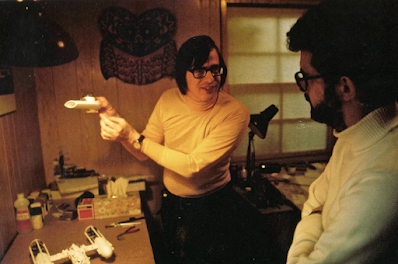Star Wars spacecraft designer Colin Cantwell has sadly passed away at the age of 90. Cantwell designed some of the most iconic spacecraft seen in the original Star Wars movie. Amongst others, he created the X-wing and Y-wing fighters, the TIE Fighter, the Star Destroyer, the Death Star and the Rebel Blockade Runner.
Cantwell was born in California in 1932 and became an expert in computers, filming techniques and visual effects. He assisted Douglas Trumbull in his work on 2001: A Space Odyssey for Stanley Kubrick, and then worked at NASA in the late1960s, providing technical assistance to news anchor Walter Cronkite as he covered the first Moon landing. He then worked on multimedia presentations on space travel.
In 1974 he was introduced to George Lucas and began work on concept art based on his Star Wars film script. He worked alongside Ralph McQuarrie, creating designs that McQuarrie fleshed out into stunning art pieces. He also used "kitbashing" to create early 3D models of spacecraft, which Lucas could then present to potential studios and investors. Lucas has credited this work with getting studios more interested in the project.
Cantwell designed the iconic X-wing starfighter, combining elements of a dart and dragster car. He came up with the split-wing concept as a way of showing when the fighter was at rest and when it was ready for action. He also designed the Y-wing, although it was partially redesigned by model maker Joe Johnston when he realised the cockpit didn't quite work. A rejected Y-wing design became the Skyhopper, which would be used by Luke on Tatooine, but budget restrictions meant that the Skyhopper only appeared as a toy that Luke plays with. The replacement landspeeder, also designed by Cantwell, was a much more simplistic design. Cantwell also designed the Jawa Sandcrawler.
For the Imperials, Cantwell designed the Star Destroyer, merging two separate designs (a two-man fighter and large capital ship) into one. He also created the TIE Fighter, following Lucas's suggestion of an instantly-recognisable and threatening silhouette. For the Death Star, Cantwell created a highly detailed model to clearly show it was an artificial construction rather than a planet or moon. The equatorial trench came about because the construction process caused the model to "dip," making creating a perfect sphere impossible.
Cantwell also created the first prototype of the Millennium Falcon and Joe Johnston built a model of it. However, at the last minute Lucas spotted a similar-looking ship in an episode of Space: 1999 and, concerned about plagiarism accusations, asked for a complete redesign. Joe Johnston handled the redesign leading to the "eaten hamburger" design seen in the finished film. However, Cantwell's work was not in vein as his prototype, re-scaled, became the Tantive IV or "Rebel Blockade Runner," later canonised as the Corellian Corvette.
Lucas asked Cantwell to help head up Industrial Light & Magic, but Cantwell felt he had loyalties to Universal Studios and decided not to work full-time with 20th Century Fox (who financed and released Star Wars). As a result, he did not return to work on The Empire Strikes Back or Return of the Jedi.
After Star Wars, Cantwell worked with Hewlett-Packard on the development of the 9845C computer, and used such a computer to create all the graphics for the 1983 film WarGames. He was nominated for an Oscar for his work on WarGames, but was (perhaps ironically) pipped to the post by Return of the Jedi.
Cantwell passed away on 21 May 2022 in Colorado after several years of being afflicted with Alzheimer's. The creator of some of the most iconic and enduring spaceships in history, he will be missed.





No comments:
Post a Comment